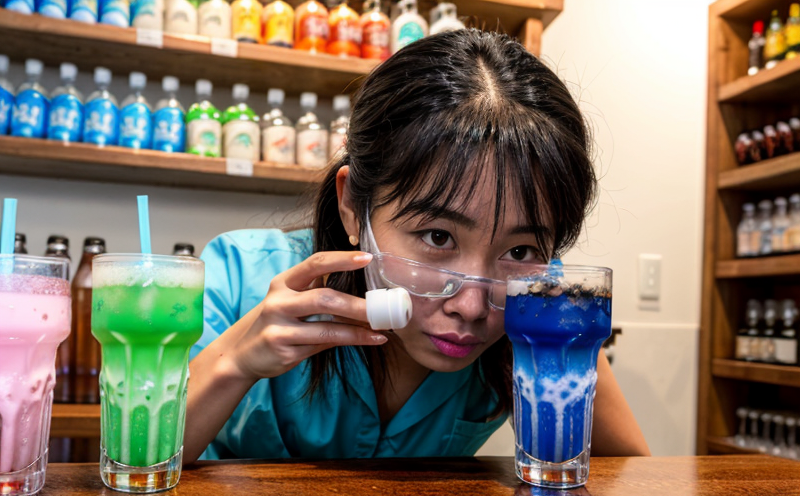ISO 6579-1 Salmonella Detection in Beverage Products
The ISO 6579 series of standards provides a comprehensive approach to detecting Salmonella in various food products, including beverages. This particular standard focuses on the detection and enumeration of Salmonella spp. in non-pasteurized liquid beverage products using the Enteric Pathogen Detection System (EPDS). The EPDS is an advanced culture-based method that allows for rapid identification of Salmonella within a specified time frame.
The process typically involves several stages, starting with sample collection from the production line or finished product. Samples are then prepared according to standard protocols, ensuring they are representative of the entire batch. Following preparation, samples are plated onto selective media which targets only those bacteria capable of causing human illness—such as Salmonella.
The EPDS uses a combination of growth conditions and biochemical tests to differentiate between potential pathogens like Salmonella from other non-pathogenic microorganisms present in complex matrices such as beverages. This ensures accurate detection even when dealing with low concentrations or multiple strains of the bacterium.
Once identified, results are reported according to ISO 6579-1 guidelines which specify both qualitative (presence/absence) and quantitative data if applicable. The standard emphasizes reproducibility across laboratories by providing detailed procedural instructions and recommended reagents.
Achieving compliance with this international standard not only enhances product safety but also builds consumer trust, particularly important given increasing public awareness about foodborne illnesses linked to contaminated beverages.
Our laboratory adheres strictly to these stringent requirements ensuring reliable outcomes. By partnering with us, you can rest assured that your beverage products meet the highest levels of hygiene and quality standards set forth by ISO 6579-1.
Why It Matters
Beverage manufacturers are under constant pressure to ensure their products remain free from harmful contaminants. Salmonella contamination can lead to severe health issues ranging from mild gastrointestinal symptoms to life-threatening conditions depending on the individual affected. Therefore, implementing robust microbiological testing protocols such as those outlined in ISO 6579-1 is crucial.
Compliance with this standard demonstrates a commitment to maintaining product integrity and protecting public health. It also helps businesses avoid costly recalls and legal disputes associated with foodborne illnesses caused by improperly handled products.
In addition, adherence to international standards like ISO can enhance market access opportunities both domestically and internationally. Many countries require imported foods to comply with local regulations that often mirror global best practices embodied in such standards. Thus, being able to demonstrate compliance may give you a competitive edge over competitors who do not meet these stringent requirements.
Moreover, maintaining consistent quality throughout the supply chain is essential for building customer loyalty and reputation. Regular testing ensures early detection of any issues allowing timely corrective actions before they escalate into major problems affecting brand image.
Competitive Advantage and Market Impact
- Informed Decision-Making: By staying ahead of regulatory changes and industry trends, companies leveraging advanced microbiological testing methods like ISO 6579-1 gain valuable insights into consumer preferences and emerging threats. This knowledge enables them to develop safer products more quickly.
- Enhanced Brand Reputation: Demonstrating adherence to rigorous standards fosters trust among consumers who are increasingly concerned about food safety. A strong reputation for quality can translate into increased market share and customer loyalty.
- Faster Recall Response Time: Early identification of contamination allows quicker response measures, minimizing the spread of pathogens and reducing potential damage to brand equity.
- Potential Export Opportunities: Many international markets have strict import requirements that must be met by manufacturers wishing to sell their goods abroad. Meeting these standards can open up new export markets for businesses operating within domestic boundaries.
The ability to provide accurate and reliable results quickly is critical in today’s fast-paced world where consumer expectations are higher than ever before. Partnering with a reputable lab specializing in such testing ensures that your organization remains competitive while contributing positively towards public health goals.
Use Cases and Application Examples
Beverage companies must regularly test their products for Salmonella to maintain compliance with regulatory requirements and ensure product safety. Here are some specific scenarios where ISO 6579-1 testing would be particularly relevant:
- New Product Launches: Before introducing a new beverage into the market, manufacturers should conduct extensive testing to confirm that it meets all necessary standards.
- Routine Quality Control Checks: Regular sampling and analysis help identify any deviations from expected quality levels early on so corrective actions can be taken promptly.
- Investigating Complaints or Outbreaks: When there are reports of illness linked to consumption of a particular product, thorough investigation using methods like ISO 6579-1 helps pinpoint the source of contamination and implement necessary changes.
- Supplier Audits: Ensuring suppliers comply with strict hygiene practices is another important aspect of maintaining overall product quality. Testing their products ensures consistency in supply chain management.
In summary, integrating ISO 6579-1 into your regular testing regimen helps protect both consumers and your business from potential risks associated with Salmonella contamination.





